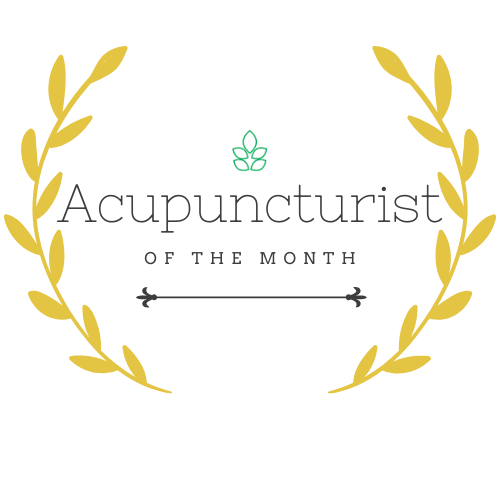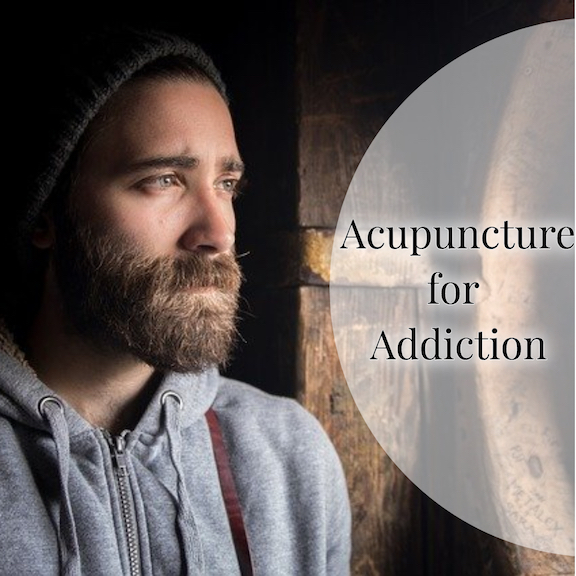Acupuncture for addiction is used in treatment and recovery centers as early as the 1970’s, when acupuncture first made its debut here in the United States. It was used in the 70’s for the same reasons patients seek it out today, and that is because it reduces stress, anxiety, trauma, and addiction. Widely considered to be the nation’s largest health problem with the ever rising opioid epidemic, addiction affects 19.7 million American adults (12 and older) according to the National Survey on Drug Use and Health (NSDUH) in 2017.
Acupuncture Benefits for Addiction
In TCM terms, addiction creates an imbalance throughout the body that affects the mental and physical health of the patient, and acupuncture restores some of this balance by managing many of its symptoms. Acupuncture’s ability to promote relaxation and pain relief is also infinitely important in the healing process of an addict. Physical suffering and stress many times go hand-in-hand with various types of addiction and acupuncture can decrease both naturally.
Acupuncture treatments can help a patient with addiction by:
- Reducing cravings
- Increasing patient retention in a
rehab/recovery center
- Ease physical pain
- Decrease anxiety/stress
- Help regulate sleep
- Ease unpleasant withdrawal symptoms
- Help the patient regulate emotions
The main reason acupuncture works for addiction recovery is that it promotes dopamine production, and raises the levels of endorphin. The release of these chemicals in the brain helps to manage the physical and emotional pain of opiate addiction and withdrawal. In Chinese medicine, a patient coming in for acupuncture treatments for their addiction enables them to nourish the yin energy and brings balance back to their natural energies. In a nutshell, acupuncture decreases the positive effects of the high that an addict would get from the substance and negative effects of the withdrawal symptoms of addiction, and therefore diminishes the need for continued use.
Acupuncture Points & Herbs for Addiction
A good portion of acupuncture for addiction lies in auricular or ear acupuncture specifically helping to reduce cravings and ease withdrawal symptoms.
There are 5 specific areas normally targeted in acupuncture for addiction:
- Liver point – controls aggression, and removes toxins from the blood and liver
- Kidney point – calms fears and repairs vital organs
- Lung point – relieves feelings of grief, and increases lung function
- Shen Men – known as the “spirit gate” this decreases anxiety
- The Autonomic (or Sympathetic) Point – encourages relaxation and soothing of the nervous system
There of course are also some standard acupuncture points that are beneficial in the treatment of addiction. However, it is hard to pinpoint an exact set of points as every patient has a different situation.
Acupuncture points for addiction:
- GB8 – Shuaigu – Leading Valley – on the head directly above the apex of the auricle and SJ20 1.5 cun within the hairline. For headaches and associated nausea and harmonizes middle jiao.
- GB13 – Benshen – Root Spirit – on the head .5 cun within the anterior hairline of the forehead, 3 cun lateral to DU24 at the junction of the medial 2/3 and the later 1/3 of the line connecting DU24 and ST8. Regulates liver and gallbladder. Used on the right side for psychological conditions like anxiety/depression. Also useful for issues which come from subconscious influences.
- LV3 – Tai Chong – Great Surge – on the dorsum of the foot in a depression distal to the junctions of the 1st and 2nd metatarsal bones. Resolves stagnation and tonifies yin balancing all LV pathologies; also a calming point for anger, irritability, insomnia, and anxiety
- CV6 – Qi Hai – Sea of Qi – midway between CV5 and CV7, 1.5 cun below CV8 (umbilicus). In general, used for qi tonification. Used for building and storing qi.
- C2 Huatuo – Huatuojiaji – Sides of Spine at C2 (right side) – .5 cun lateral to the lower border of the spinous processes of C2. The right side is used for anxiety/depression.
In addition, herbs can help support a patient’s pursuit for balance and recovery. Just like with acupuncture points, there is no one set formula for addiction as each patient is coming in with a unique issue. There are always come good “stand-by” herbs that can be used within a formulation for addiction patients.
Herbs for addiction:
- Ginseng – Renshen – used for the prevention of opioid use and dependence
- Rhizome Corydalis – Yanhusuo – helps prevent relapse to chronic drug dependence
- Salvia Miltiorrhiza – Danshen – beneficial inhibitory effects on alcohol intake
- Radix Pueraiae – Gegen – beneficial inhibitory effects on alcohol intake
- Hawthorn berries – for a weakened heart due to eating disorders or chemical substance abuse.
- Dandelion– good for the liver, kidneys, and spleen. Essential for warding off infection and keeping bod fluids in balance. Eating disorders are hard on the spleen especially, and dandelion helps replace the nutrients lost from them.
- Milk thistle – heals the liver especially after chemical abuse. The best part is that is helps to heal the liver without taking away the liver’s ability to detoxify drugs and environmental toxins from the body. Basically helps the liver heal while protecting the body from daily exposure to toxins.
- Burdock Root – tonic for the liver and kidneys, purifies blood, antioxidant, and anti-inflammatory.
Recovering from addiction not only is a whole body experience, but the mind needs to heal as well. If a patient is suffering from mental turmoil or tension try adding chamomile, lemon balm, or holy basil to the daily herbal protocol (depending on the patient & their specific condition, of course).
Acupuncture for Addiction Research
The opioid addiction has left the United States in desperation to turn to another treatment modality. There have been many studies, and reviews of studies in recent years to decipher if, how, and why acupuncture treatment works for addiction. It has also been tested as potentially an adjunct therapy along with others already in place in recovery centers and rehabs.
Acupuncture for addiction adjunct study:
- 100 patients were enrolled in this
study, 50 in the National Acupuncture Detoxification Association (NADA), and 50
in the control group. Traditional treatment was provided to both groups
including a 12-step orientation and a variety of other group therapies. The
NADA patients received 5 bilateral ear acupuncture twice a week with amount of
time depending on each patient, but were required to check in upon completion
and at the 3 and 6 month marks.
- Results of this study show positive findings in the NADA group along with traditional care with improvements in feeling better about oneself, improved energy, likelihood of employment upon discharge of a rehab/recovery center program, decreased alcohol use at the 3 and 6 month follow ups, decreased tobacco use in the 6 month follow up, and improvement in quality of life/depression.
Acupuncture for drug addiction study:
- The research was conducted to review studies examining the effects of acupuncture on addiction. Studies reviewed were public works from 2000-2014 of which 119 documents were assessed.
- The results show that the HT7, ST36, and SP6 acupuncture points can affect drug-induced physiological activities. They do note that further studies need to be done with this condition involving various addiction types.
Electroacupuncture adjunct for opiate addicts study:
- A total 106 patients participated in the research study who were undergoing methadone maintenance therapy (MMT). Participants were split into the electroacupuncture group and the control group. The electroacupuncture group received treatment for 15 minutes, twice weekly, for 4 weeks.
- Results of this study shoe electroacupuncture to be beneficial because it improves opioid abstinence, and can also improve quality of life in addicts.
Studies that have been done on acupuncture for addiction thus far all seem to point to the positive, however, many of them do note that they cannot 100% confirm the positive findings as there are many that were of low quality, and more large-scale, high-quality studies need to be done.
Acupuncture & Addiction
When it comes to addiction, there are a wide variety of cases that are seeking recovery. According the NSDUH in 2017 8.5 million American adults suffered from both a mental health disorder and a substance use disorder, or co-occurring disorders. If that’s not enough, 21-29% of patients who are prescribed opioids misuse them, 8-12% develop an opioid use disorder, and 4-6% of those who misuse prescription opioids transition to heroin.
As acupuncture providers, we can hope to help reduce these numbers by providing a modality that’s thousands of years old that works, and aid in these patients recovery no matter the addiction. Although further research is needed in acupuncture for addiction, it is clear that there are positive and promising results thus far.
For individuals seeking recovery from addiction for smoking, drugs, alcohol, eating disorders, and other concerns, acupuncture is absolutely worth a try in the journey to regaining health and control.

Have more knowledge or an acupuncture/TCM specialty you want to call attention to and share?
Become our next Acupuncturist of the Month!
Share your knowledge, highlight your work, and lift up the acupuncture profession for you and other professionals!
Email us at acucontinuingeducation@gmail.com or click here today to learn more.

